Marriott Bonvoy’s portfolio includes 32 different brands. More than any standout architectural or interior design details, consistent quality and a beloved rewards program tend to keep travelers checking into the world’s largest hotel chain. However, one of the first things that struck me about the Munich Marriott Hotel City West, one of the brand’s newest locations, as I approached from the nearby train station on a sunny June afternoon was its impressive, almost Bauhaus-esque silhouette on Landsberger Strasse, the main thoroughfare that leads into downtown Munich.
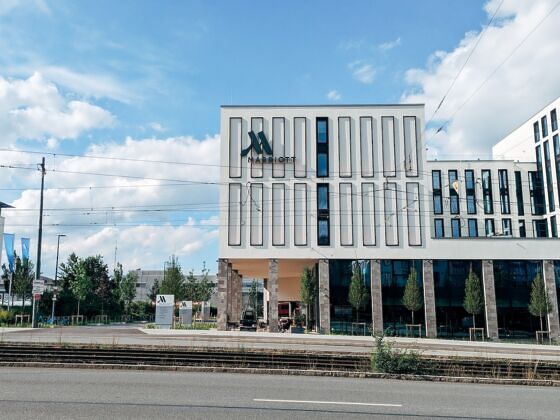

Munich's Sleek New Marriott Embraces the City’s Royal and Industrial Heritages
I’d read that the hotel sits on what was once a locomotive shed, subtly referenced by materials throughout, including brick and warm metals, which became apparent once I stepped inside the lobby. A well-dressed concierge, whose bespoke uniform I later learned was created by a Munich-based designer, greeted me in German. First impressions always count, and if the polished design language of the reception — which leaned decidedly more boutique than I’d imagined for a 398-room Marriott, with the largest ballroom in Europe no less — it was safe to say that this sparkling new build nixed any preconceived notions I may have subconsciously held about checking into a brand-new, big-name hotel in the Bavarian capital.
General manager Rene Mooren, a 27-year Marriott veteran, was given free rein to get creative with this “flagship property.” He tapped Studio Lux Berlin to lead its design, which he tells me captured the essence of Munich by weaving local influences to create an environment that feels more akin to spending time in a luxury residence than your typical hotel. Design elements nod to everything from the city’s once-industrial Westend neighborhood where the hotel is situated (although it’s just a 12-minute tram ride to the Old Town) to royal heritage and the Bavarian Alps. But it’s not just a property that’s made to be admired — hands-on guest experiences, such as a weekly pasta-making class, also help to elevate stays at the Munich Marriott.
The rooms at Munich Marriott Hotel City West
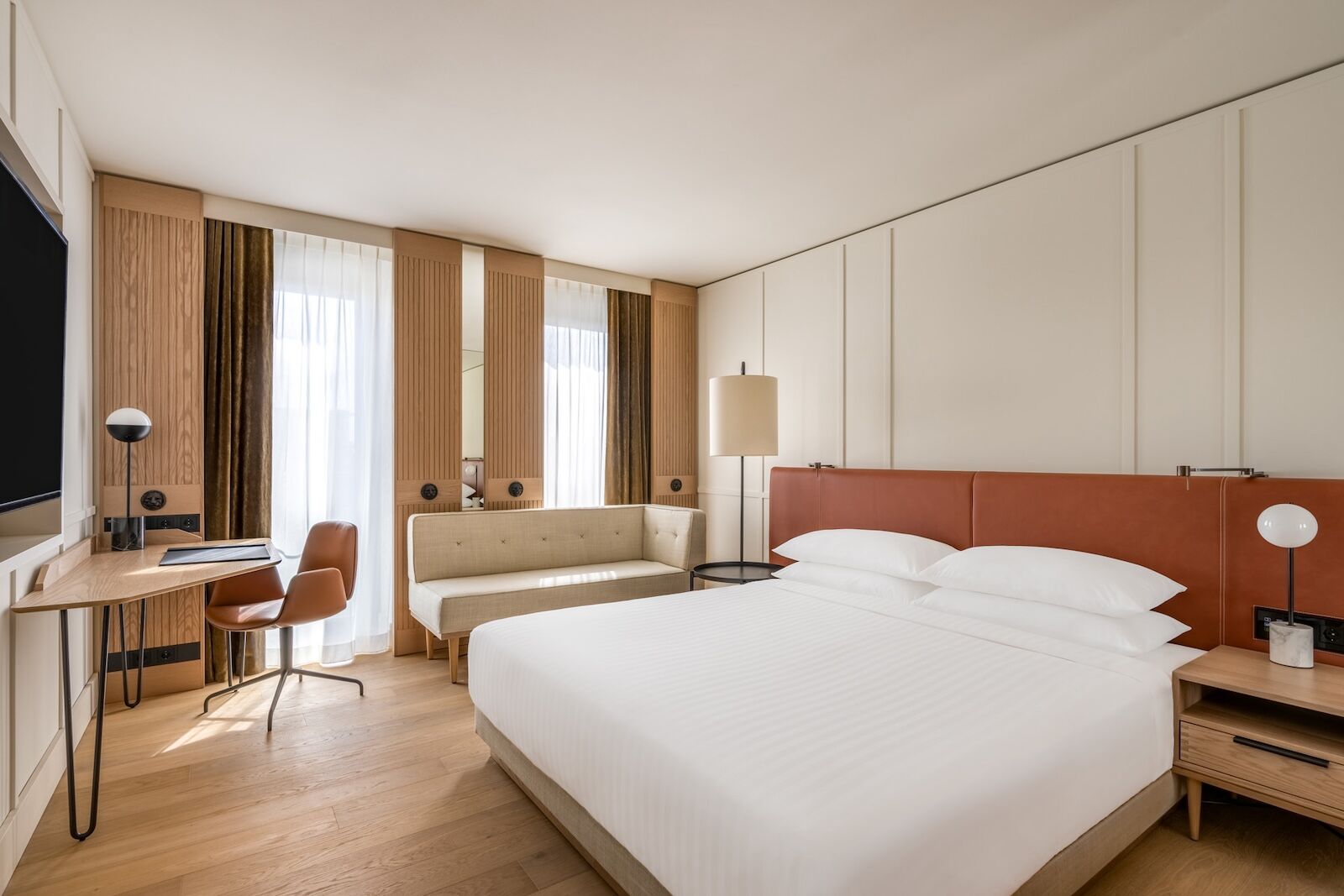
Photo: Munich Marriott Hotel City West
There are nine room categories to choose from at the Munich Marriott at various price points, including three suites. The Executive Suite — which features a separate living area, freestanding tub in the bathroom, and complimentary M Club lounge access (more on that later) — is the premier option.
My Deluxe King room was located on the sixth floor and passed my Goldilocks test with flying colors: everything you need with enough space to unpack and spread out for a few days without tripping over open suitcases or errant laptop power cords. The same high-touch design details used in the common spaces impressively feature in all guest room categories: locally sourced wood for the floors and furnishings, handsome cinnamon-red leather headboards, and satisfying little leather drawer pulls. Several elements are inspired by Munich’s royal residences, including the paneled walls and decorative metal lion heads that nod to the statues guarding the former palace.
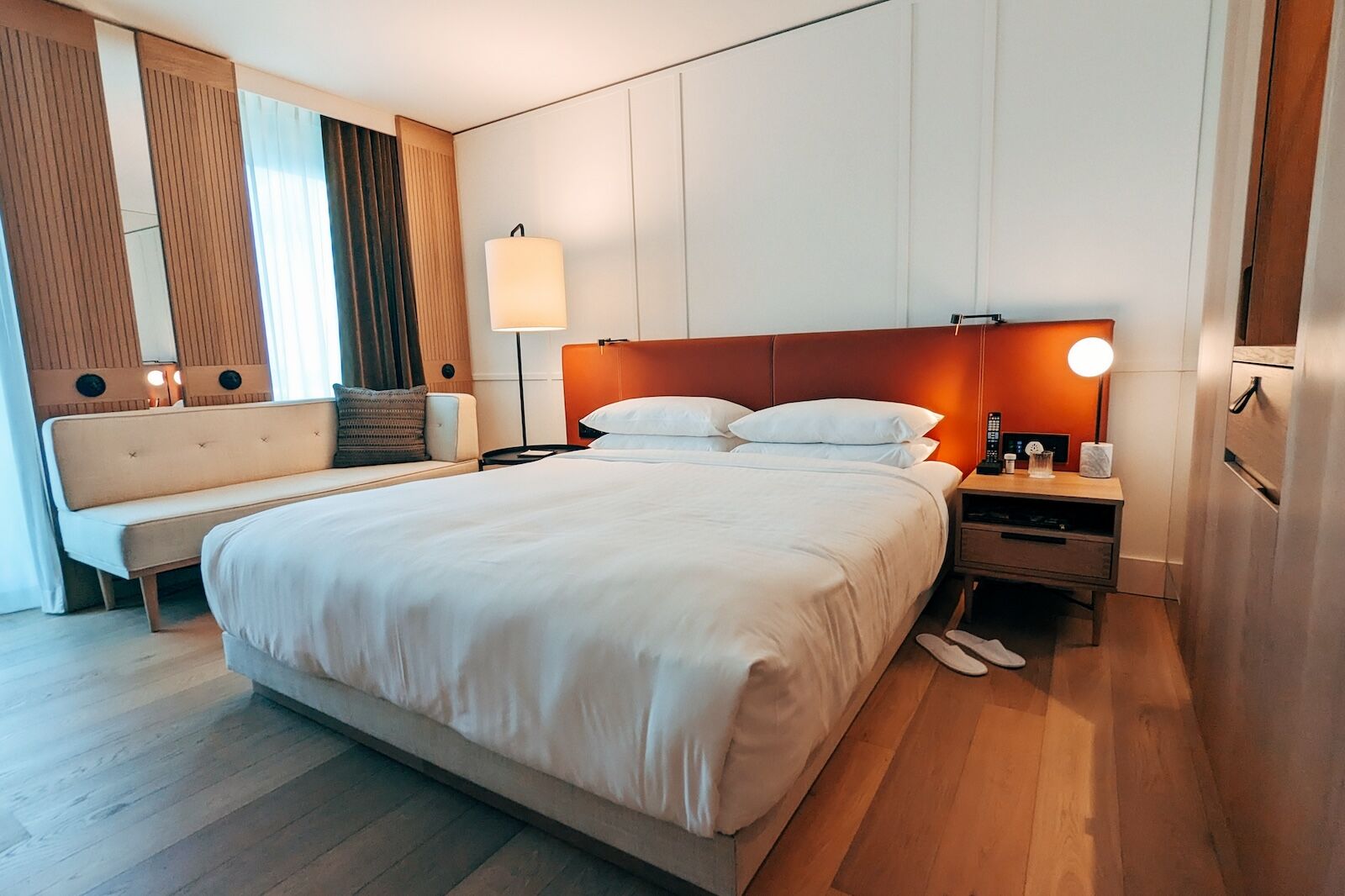
Photo: Keri Bridgwater
Everything in my room felt well made and intuitively laid out, from the spacious luggage storage area near my front door to the little nook where I was delighted to find a L’OR espresso machine and drawer filled with pods, plus standard hotel room accouterments (ice bucket, glasses, and a mini fridge but no mini-bar.) The bathroom was particularly impressive, with underfloor heating and a Japanese Toto washlet. There was a small hand soap and travel-sized body lotion beside the sink, plus full-sized Marriott branded shampoo, conditioner, and body wash in the shower, but you’ll need to bring your own amenity kit.
For in-room entertainment, there was a TV with a handful of English-language channels and an option to log into Netflix or Amazon Prime. My view across the train tracks might not have been much to write home about, but if it’s vistas across the Westend and Munich skyline you’re after, book one of the corner suites on the seventh floor. Cost-wise, the Deluxe King is usually priced around $235 a night while an Executive King with M Club Access starts at around $300. For an Executive Suite, though, expect to pay a little more than $900 per night for a pre-paid, non-refundable member rate. Pro tip: being a Marriott Bonvoy member here is a definite perk, plus you’ll earn points for that next Marriott Bonvoy stay.
The amenities at Munich Marriott Hotel City West
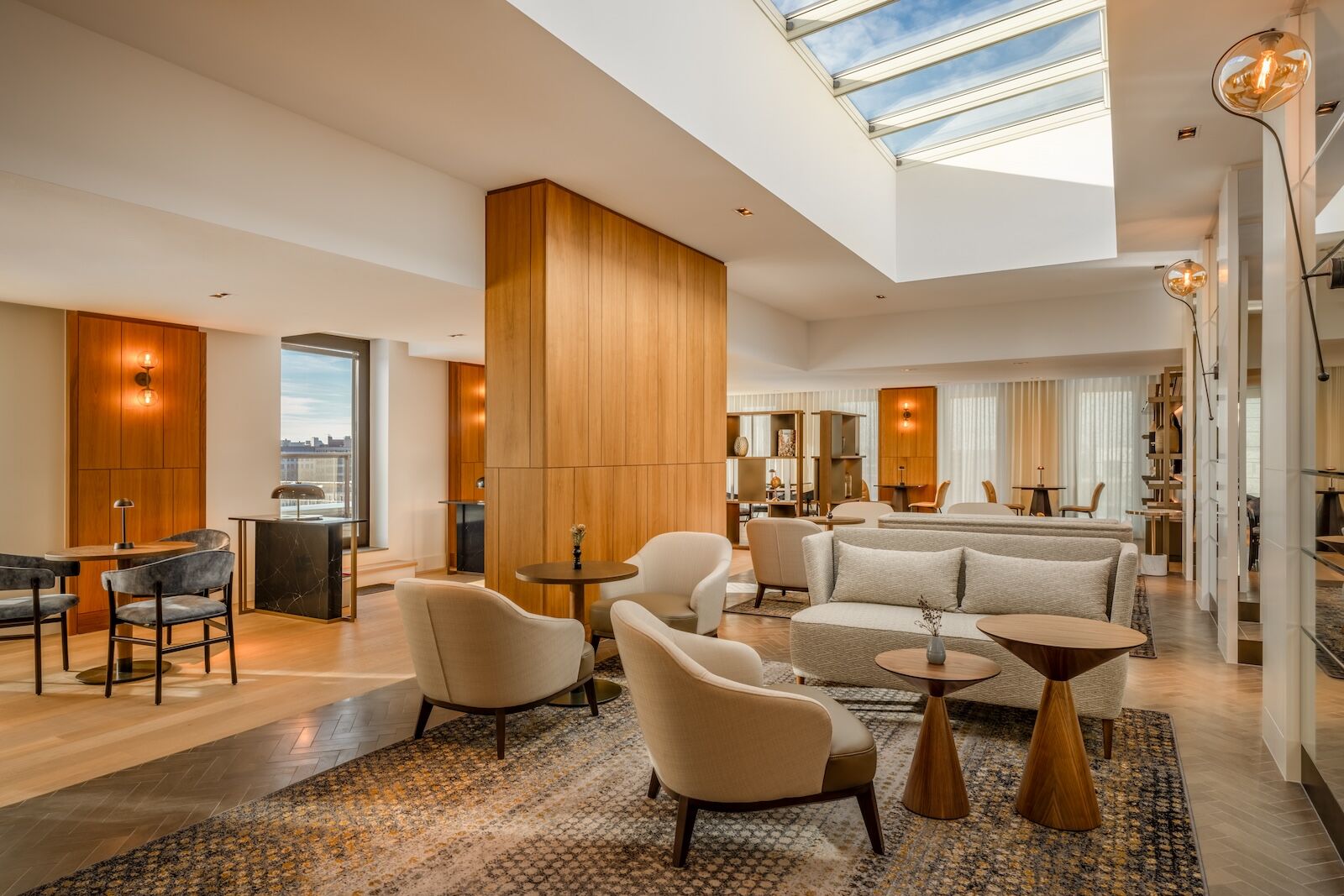
Photo: Munich Marriott Hotel City West
As the sort of traveler with good intentions of using the hotel gym, I often pack a pair of sneakers but never actually fit in a workout. This was not so at the Munich Marriott where, having leapfrogged my way to Southern Germany from Honolulu via San Diego, I found myself attempting to beat the jet lag with a roughly two-mile virtual alpine hike on the Technogym treadmill at 1 AM on my first night. Hotel gyms aren’t usually up to scratch for strength training, but I was pleasantly surprised to find the 24-hour fitness club well equipped, not only with a pile of neatly folded white hand towels and bottled mineral water but also with a legit leg press machine for squats and decent rack of free weights.
Reserved for qualifying Marriott Bonvoy Platinum Elite, Titanium Elite, and Ambassador Elite members or guests who book an Executive Room level and above, the hotel’s swankiest amenity is the seventh-floor M Club, which is also accessible to other guests possible for a fee: approximately $90 for a day pass. Featuring 24-hour access to breakfast, light snacks, and evening bites, plus premium WiFi, the exclusive lounge is especially pleasant on the rooftop terrace, from where you can spy the Bavarian Alps on a clear day.
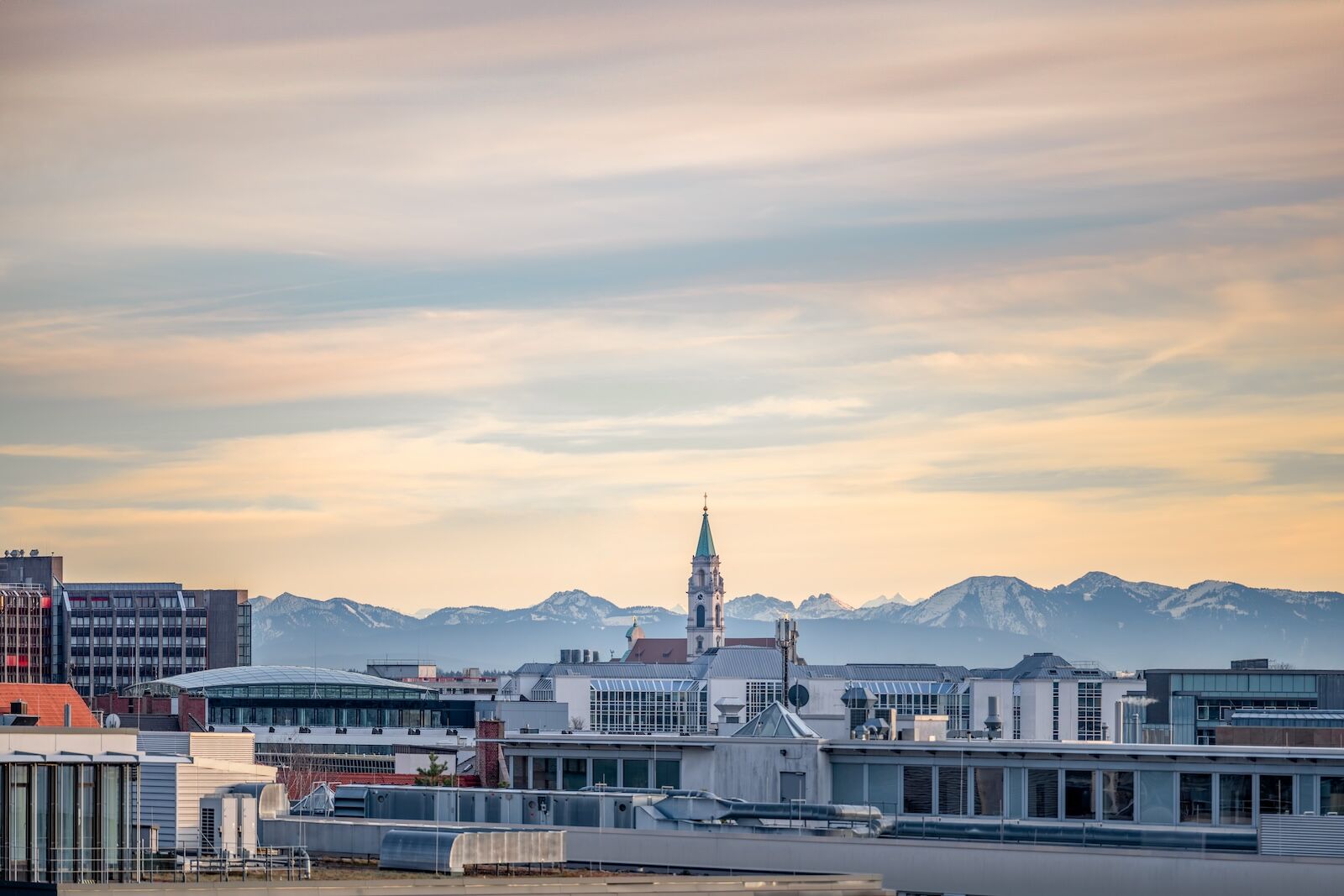
Photo: Munich Marriott Hotel City West
Back downstairs, the petite Lobby Marketplace sells drinks and snacks. Mooren, the tech-loving general manager, is also poised to debut two digital “At Your Service” concierge stands that can help guests handle traveler requests — everything from booking tickets and buying flowers to making dinner reservations at restaurants across the city.
For business travelers, the hotel’s meeting rooms and studio spaces are stylish, modern, and fully equipped. These benefits extend to larger-scale corporate travel, too. In fact, the Munich Marriott was nominated for Best MICE Hotel in Europe 2024 and Best MICE Hotel in Germany 2024 (MICE stands for “meetings, incentives, conferences, and exhibitions”).
The dining at Munich Marriott Hotel City West
Being that the hotel is based in the Bavarian capital, you might assume that its culinary offerings would skew in the direction of sausages and schnitzel. But with its proximity to the Italian border and robust summertime café culture, Munich is often referred to as “Italy’s northernmost city” — and so who better to helm the hotel’s four dining concepts than a real-deal Italian head chef?
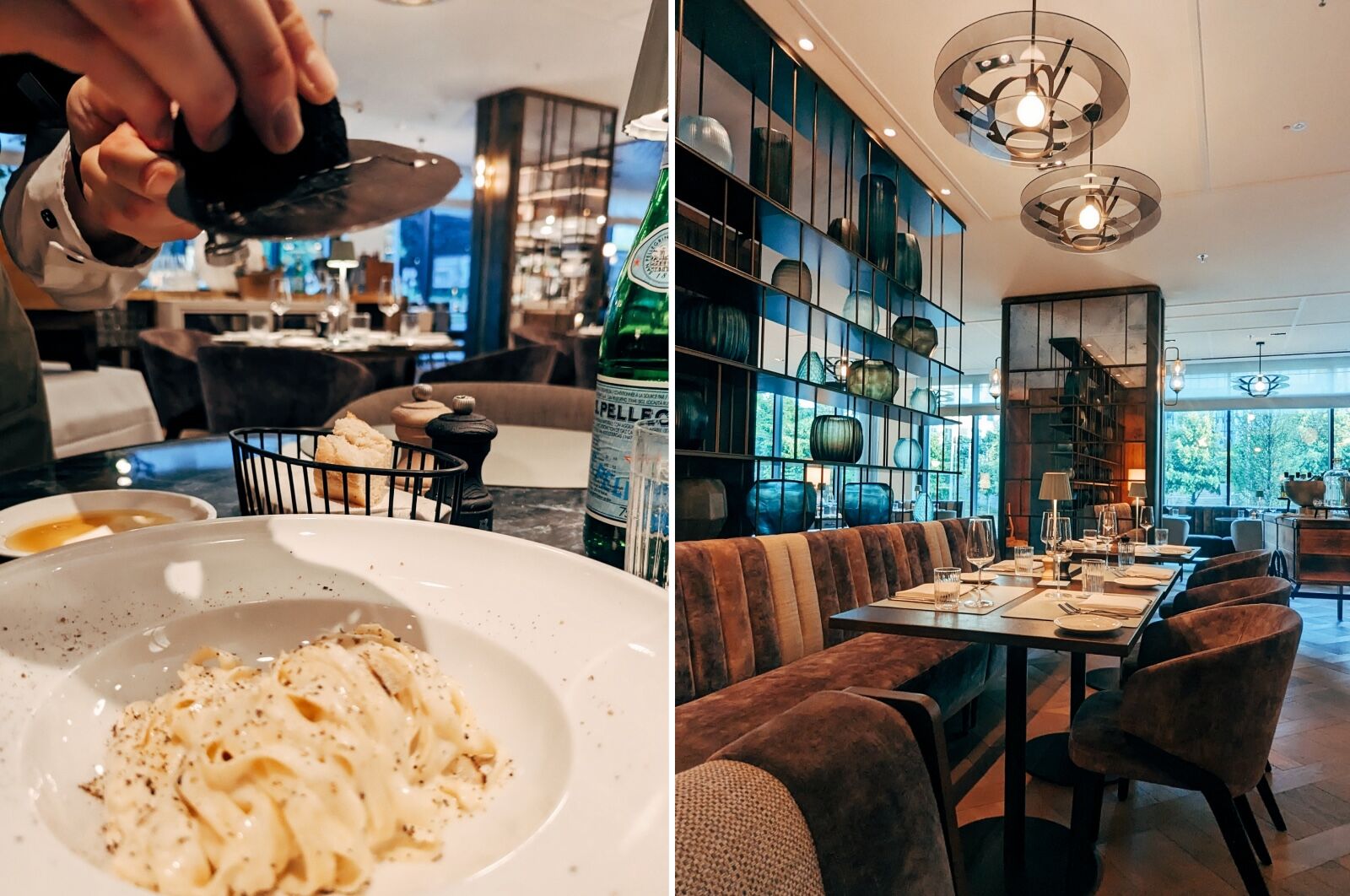
Photo: Keri Bridgwater
Marco De Cecco has put signature restaurant Assoluto Ristorante & Vineria on the map as a top destination for authentic Italian cuisine in Munich. His dinner menu spans antipasti favorites (think beef carpaccio with pickled mushrooms and creamy burrata, sprinkled with pine nuts) to Napoletana-style pizzas, plus a solid selection of pasta dishes, including my server-recommended cacio e pepe. Prepared tableside, the dish comprised a generous spoonful of homemade fettuccine swirled inside a just-blow-torched Parmesan wheel and seasoned with a flourish of freshly ground truffle. It balanced beautifully with the minerality of the German riesling that I ordered and left just enough for dessert: ananas marinato, or marinated pineapple with coconut sorbet.
Much like the rest of the hotel, Assoluto is a chic and well-designed space whose intimate seating areas afford prime vantage points to watch the trams whizz by on Landsberger Strasse. It doubles as a lunch spot on weekdays from noon to 2 PM, but it’s also where you’ll eat breakfast each morning – a smorgasbord buffet of fruits, cold cuts, and cheeses; an impressive array of fresh-baked breads and pastries; and classics like eggs, sausage, and bacon.
Next door, Assoluto Caffe is the place to grab an afternoon cappuccino or take advantage of Aperitivo Afterwork, which is hosted Thursdays from 5 to 7 PM and is popular among both hotel guests and Munich locals who drop by for a drink and complimentary snack. Drink options vary, from a zero-proof Nogroni to a cocktail called the Amalfi, made with house-crafted Limoncello. The deli-style shop here sells an excellent range of olive oil and balsamic vinegar, too, along with bags of housemade pasta by chef Marco de Cecco himself.
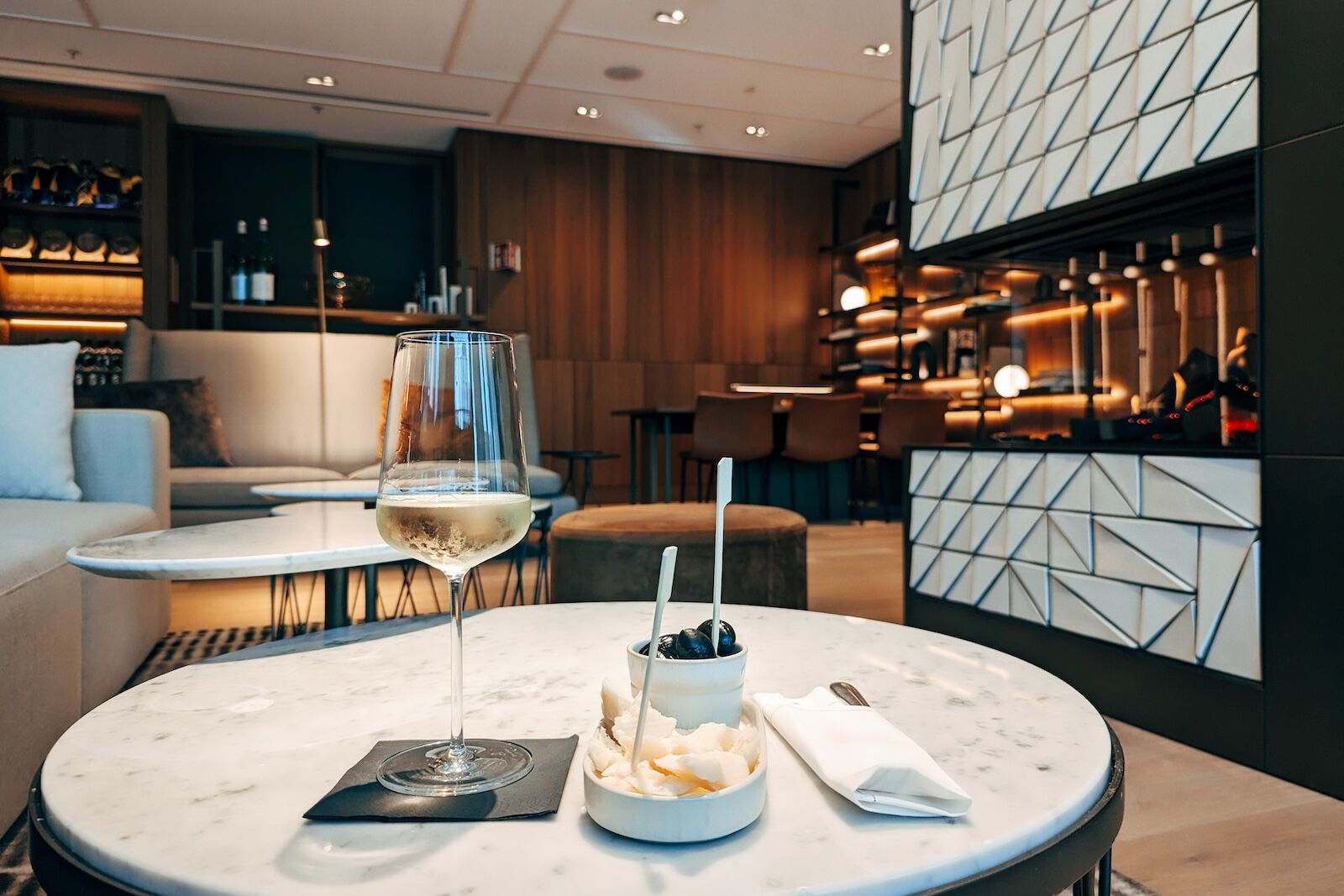
Photo: Keri Bridgwater
After a day spent exploring, stop by the central Westhub Bar & Lounge for a glass of wine and small bites, like olives and truffle fries, or perhaps a cocktail by head mixologist Nico Wach (try the Sakura no Hana with Roku Cherry Bloom, Tio Pepe Sherry, lemon, and lemongrass foam). Styled like a smart but welcoming Tribeca loft living room, with well-placed objet d’art and coffee table books, the space is anchored by a central bar whose industrial design was inspired by the nearby Hacker Bridge. There are numerous sectional sofas around the modernist fireplace where you can get cozy, along with plenty of places to plug in the laptop and “Work From Hotel.”
Elsewhere, Vineria features an impressive 1,500-bottle collection and is an intimate space for private tasting events. But if you’re craving German beer, head to the hotel’s brand new rooftop biergarten (a first for Munich) on the seventh floor where beers from two small-batch breweries (Starnberger and Weihenstephaner) and Bavarian bites are served from a charming alpine-style wooden chalet from 4 to 10 PM every Tuesday through Saturday.
What to do around Munich
Munich is more than its world-famous Oktoberfest or neo-gothic Neues Rathaus (New Town Hall) whose glockenspiel performance draws a considerable crowd each morning just before 11 AM. Germany’s third-largest city has museums, art galleries, palaces, and plenty of places to enjoy a large stein of something cold and refreshing — all within easy reach of the Munich Marriott, thanks to its stellar proximity to public transportation.
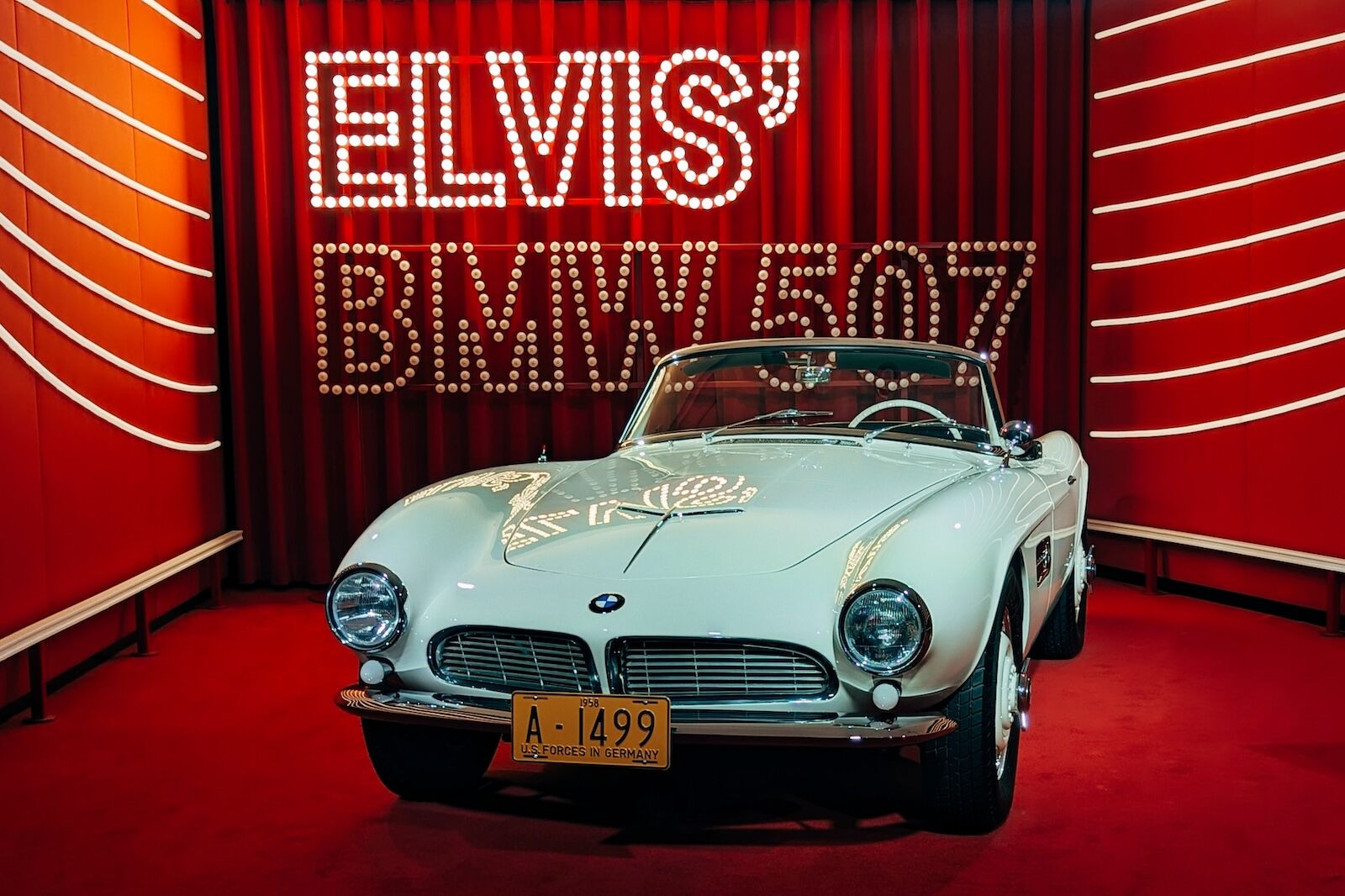
Photo: Keri Bridgwater
A tram stop literally on the hotel’s Landsberger Strasse doorstep connected me with the U-Bahn, which I rode to the city’s north for the BMW Museum. It’s a must for Bavarian Motor Works fans and non-car enthusiasts, because who doesn’t like geeking out over classic cars, including Elvis Presley’s fully restored BMW 507? One stop away at Olympiazentrum, I hopped on a bus for Nymphenburg Palace. Modeled on Versailles, the Baroque royal residence and its 490-acre park was once the summer hangout and hunting ground for generations of Bavarian rulers. It also proved to be an agreeable setting to while away a couple of hours before strolling back to the hotel.
For my first evening in town, though, I explored the Westend district surrounding the hotel. It’s a laid-back and walkable residential neighborhood peppered with local restaurants, homegrown concept stores (check out Weissglut and Heiße Liebe) and some cool street art murals. At its edge is the Bavaria statue, a 19th-century landmark; Munich’s oldest brewery, Augustiner-Keller, which was established in 1328; and the Theresienwiese open space (German for “Therese’s meadow”) where Oktoberfest famously takes place. Saving the Old Town for my last day, I hopped on a Number 19 tram in front of the hotel to wander around Aldstadt, which is anchored by its two most famous squares: Marienplatz and Odeonsplatz. (Rub one of the original bronze lion statues here for good luck.)
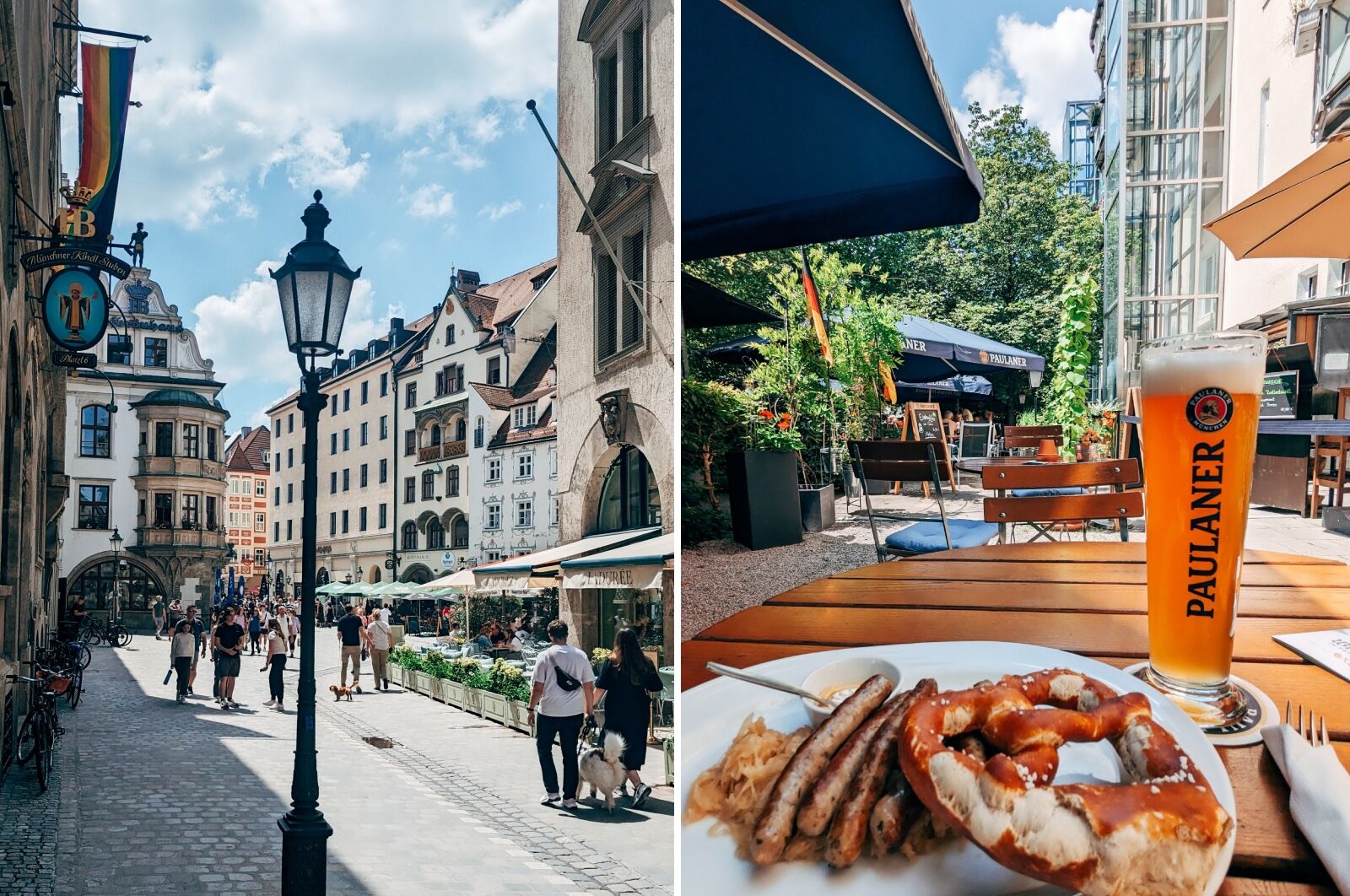
Photo: Keri Bridgwater
Munich is famously home to many of Germany’s oldest breweries and beer halls, and you’ll be spoiled for choice when it comes to enjoying a brew and traditional Bavarian meal in this part of the city. Founded in 1589, Hofbräuhaus is a well trodden when-in-Munich tourist stop. Finding the crowds and live polka music a bit much, I considered the upscale restaurant Pfistermühle, whose dining room is located inside a 16th-century mill, before deciding on the more affordable Wirtshaus im Braunauer Hof a few minutes walk from the center. The cozy spot served Paulaner beers (including two zero-proof pours) alongside classic dishes (small but spicy local sausages with sauerkraut and a pretzel). Its quiet, sun-dappled garden was a great place to watch local Müncheners lunching with friends and write a few postcards.
Getting to Munich Marriott Hotel City West
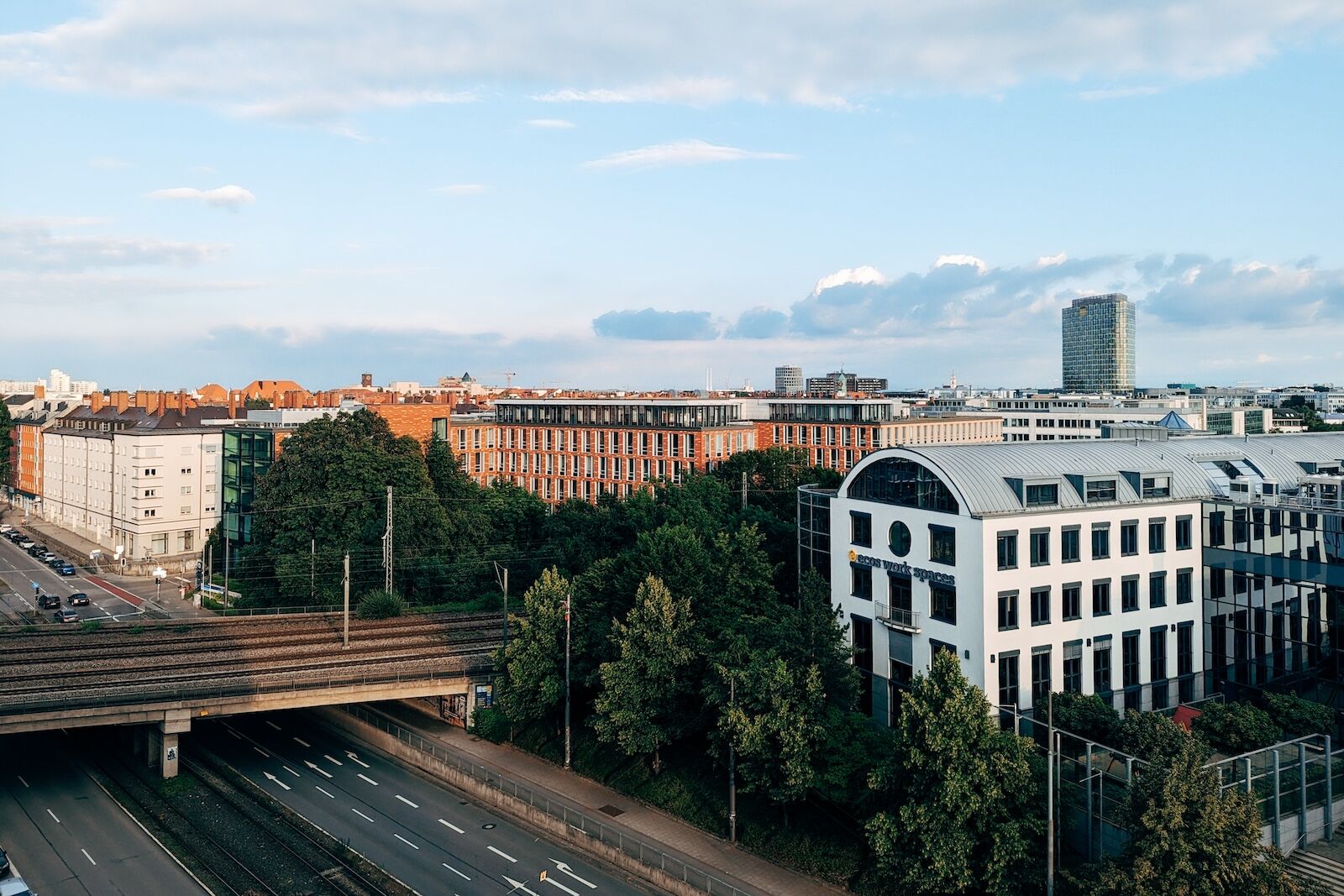
Photo: Keri Bridgwater
Several major airlines — including American, Delta, United, and Germany’s flag carrier Lufthansa — operate daily flights to Munich’s Franz Josef Strauss Airport (MUC). US cities with direct flights include New York, Boston, San Diego, and Los Angeles. The airport is 27 miles northeast of the city and takes 35 minutes by car (depending on traffic) or 50 minutes to an hour if taking the S Train to Munich Central Station (where you’ll need to jump on a tram) or Hirschgarten Station (which is a 10 minute walk from the hotel).